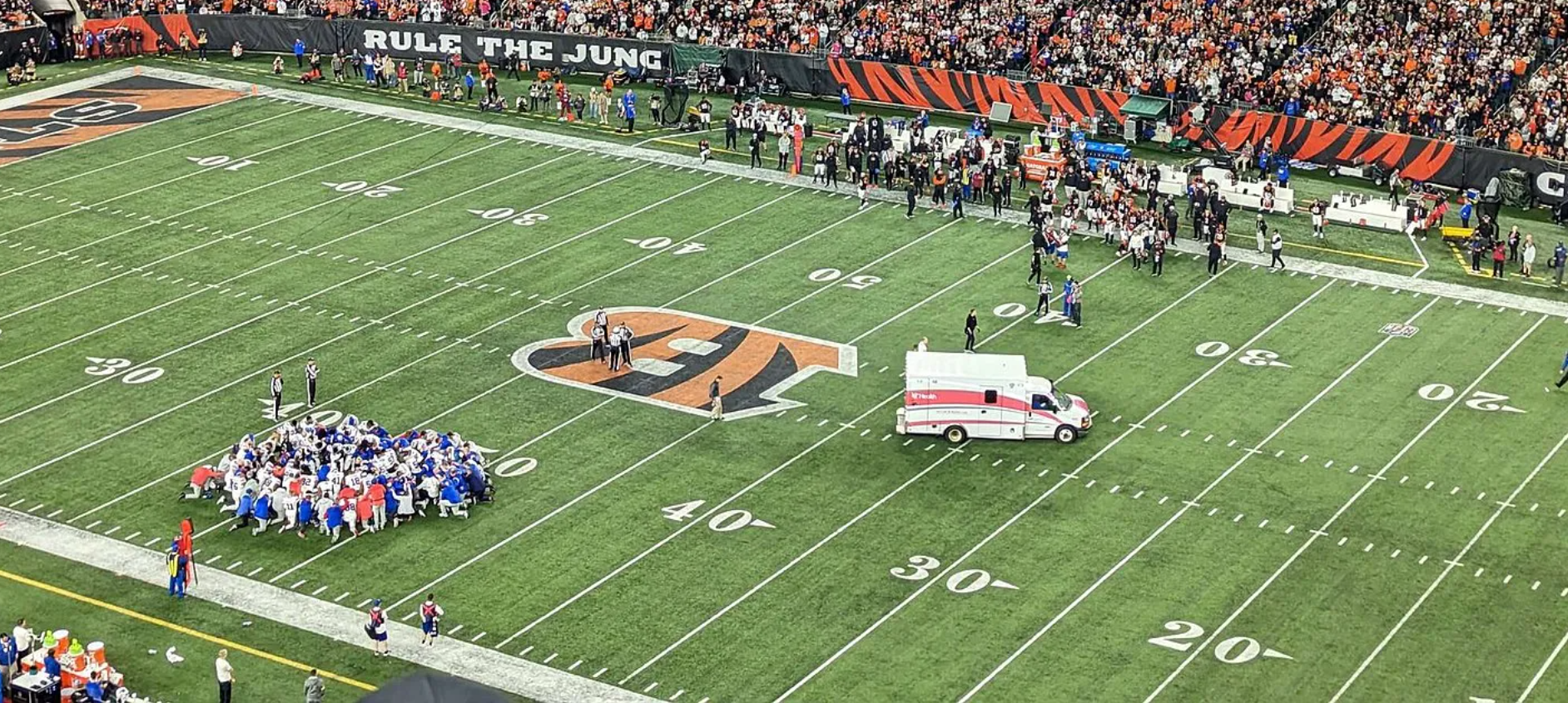on
Monday night’s football game between the Buffalo Bills and the Cincinnati Bengals ended abruptly and tragically, leaving sports enthusiasts and players alike in shock.
So shocked that on Tuesday, The Nation’s sports editor Dave Zirin soundly denounced NFL football — and called out racism in the sport.
The game is “a gladiatorial combat sport dependent on the Black players, Black bodies, and Black minds who make up 70 percent of the league’s players,” he wrote. “Denying their humanity is an essential part of the NFL’s brand.”
Race has always played a factor.
TIMOTHY CONLEY, FORMER SEATTLE SEAHAWKS PLAYER
After 24-year-old Bills safety Damar Hamlin took a hit on Monday night, he collapsed on the field, illustrating what many fear about the number one sport in America: death is closer to players than we realize.
According to team officials, Hamlin went into cardiac arrest during the first quarter of the game after a tackle from Bengals receiver Tee Higgins. People in the stadium and millions viewing on television watched for nearly 10 minutes as medical personnel administered CPR and got Hamlin’s heart to beat again — all while players from both teams stood or kneeled around him with tears streaming down their faces.
The game halted for over an hour before National Football Leagues officials announced that it would be postponed. Joe Buck, ESPN’s play-by-play broadcaster, said on air that players were told they’d have “five minutes” to get ready to resume playing.
Us going out there and being told to run as hard as possible, hit as hard as possible, make plays and stuff like that, as a kid, that’s all we think about because that’s all we see.
JEREMIAH NELSON, NFL DRAFT PROSPECT
However, in a conference call with reporters after the game, NFL executive vice president of operations Troy Vincent said, “I’m not sure where that came from. Five-minute warmup never crossed my mind, personally.”
But the nation now faces the broader question of whether we will stand in solidarity with players, the majority of whom are Black men, and demand that they be kept safe and treated humanely — or will we continue to emphasize the entertainment-first construct of the sport?
“Race has always played a factor because whether people want to talk about it or not, African Americans or Black folks, in general, are still looked upon in many instances as second-class citizens — or not even considered human beings depending on who you talk to,” says former Seattle Seahawks player Timothy Conley who is now the chair of the cinema and film department at Columbia College Hollywood in Los Angeles.
“People just see them as commodities,” Conley says.
Skip Bayless, one of two “Undisputed” sports broadcasters, received significant backlash for his comment on Twitter that seemed to emphasize the commodity aspect of the NFL’s decision to postpone the game.
“No doubt the NFL is considering postponing the rest of this game – but how?” Bayless tweeted as medical personnel tended to Hamlin on the field. “This late in the season, a game of this magnitude is crucial to the regular-season outcome … which suddenly seems so irrelevant.”
Hall of Fame wide receiver Terrell Owens reposted Bayless’ tweet to Instagram and commented that it is “the most despicable tweet ever.”
“I hope you LOSE YOUR JOB!!” Owens wrote.
Media outlets have also been under fire for repeatedly playing the video of the moment of impact and Hamlin’s collapse.
“Please stop. Whether it is police shooting Black men, or something like this, media outlets treat Black suffering like porn. Just stop,” Dr. Stacey Patton, a journalist and research associate professor at the Institute for Urban Research at Morgan State University, tweeted about MSNBC’s coverage.
Jeremiah Nelson, a 24-year-old NFL draft prospect, began his football career at age 8. He says being the roughest and toughest guy on the field was all he knew.
“Us going out there and being told to run as hard as possible, hit as hard as possible, make plays and stuff like that, as a kid, that’s all we think about because that’s all we see,” Nelson tells Word In Black.
According to Nelson, who played for four different teams during his collegiate years, “African American or minority athletes tend to be seen as more ‘superhuman’ in other people’s eyes” when it comes to being a team member.
“In certain ways, it is an advantage for us — you know, like getting recruited — but when it comes to our safety and being humanized, that’s where the problem is.”
Nelson said even in regards to an injury — or being understood when speaking about your pain level — there is a possibility you’ll be disregarded, or not taken as seriously, just because you’re a 6 foot-plus tall, 240-pound Black man.
“It’s not worth it, “ Nelson says. “We’re raised to think we can get over anything with a little bit of recovery or time off, but in some situations – like this one – your health is put at risk. Not just to play, but to stay alive.”
Will Brinson, CBS Sports podcaster and senior writer, called on Twitter for the NFL to take some form of accountability for making (or not making) the appropriate call during such an intense moment.
“Troy Vincent claimed no one from the league told the broadcast booth about the five minute rule. Joe Buck’s as pro as they come, he didn’t go off cuff here. Just admit a mistake for once?”
“The NFL has a long way to go, and it’s not a perfect business,” Conley says. “There are things they’ve done in terms of strides to change things around, like concussion protocols. Those protocols didn’t exist when I was around.”
Meanwhile, Hamlin is currently in critical condition at the Cincinnati Medical Center.
Join our email list to stay connected.






